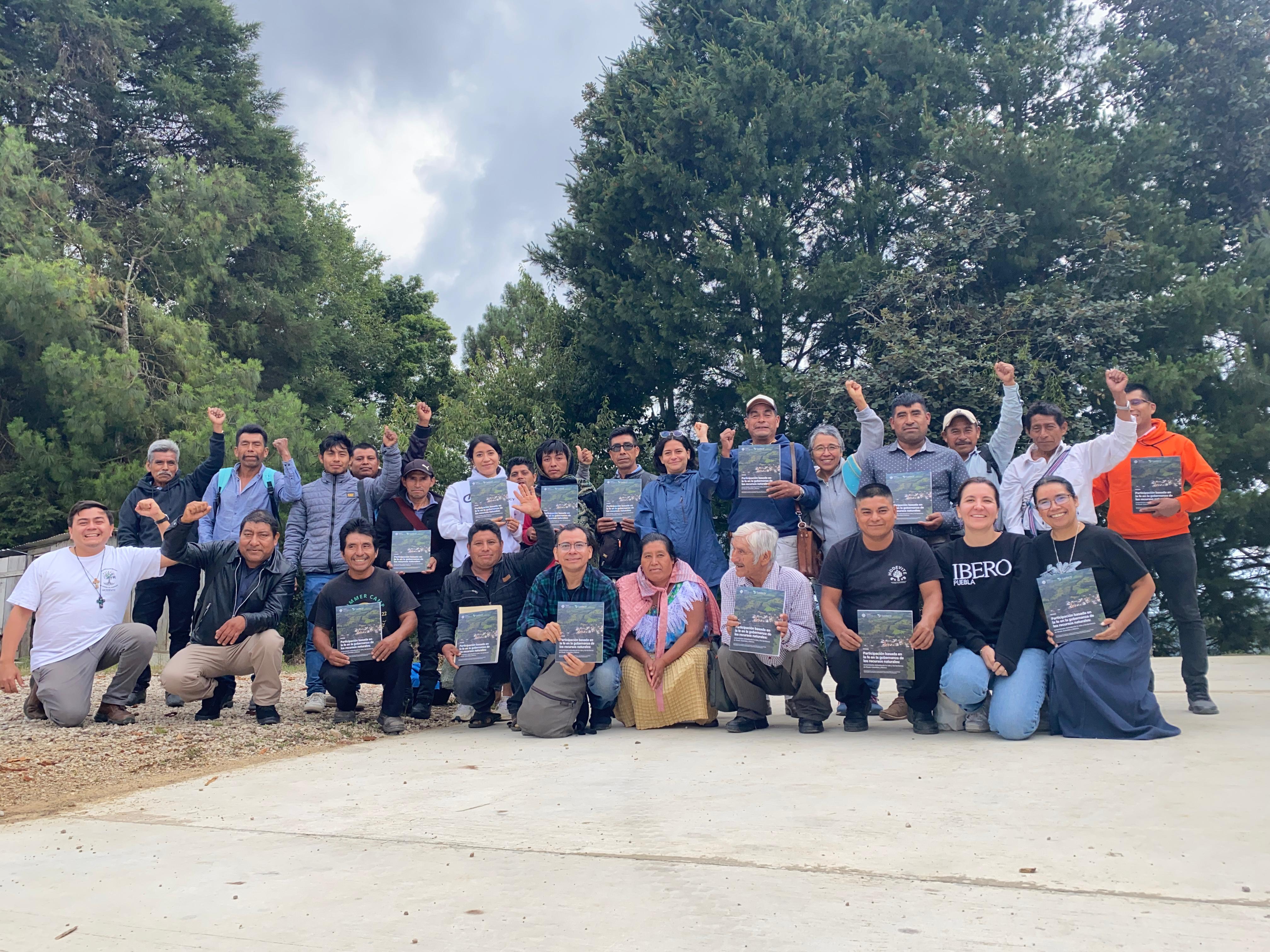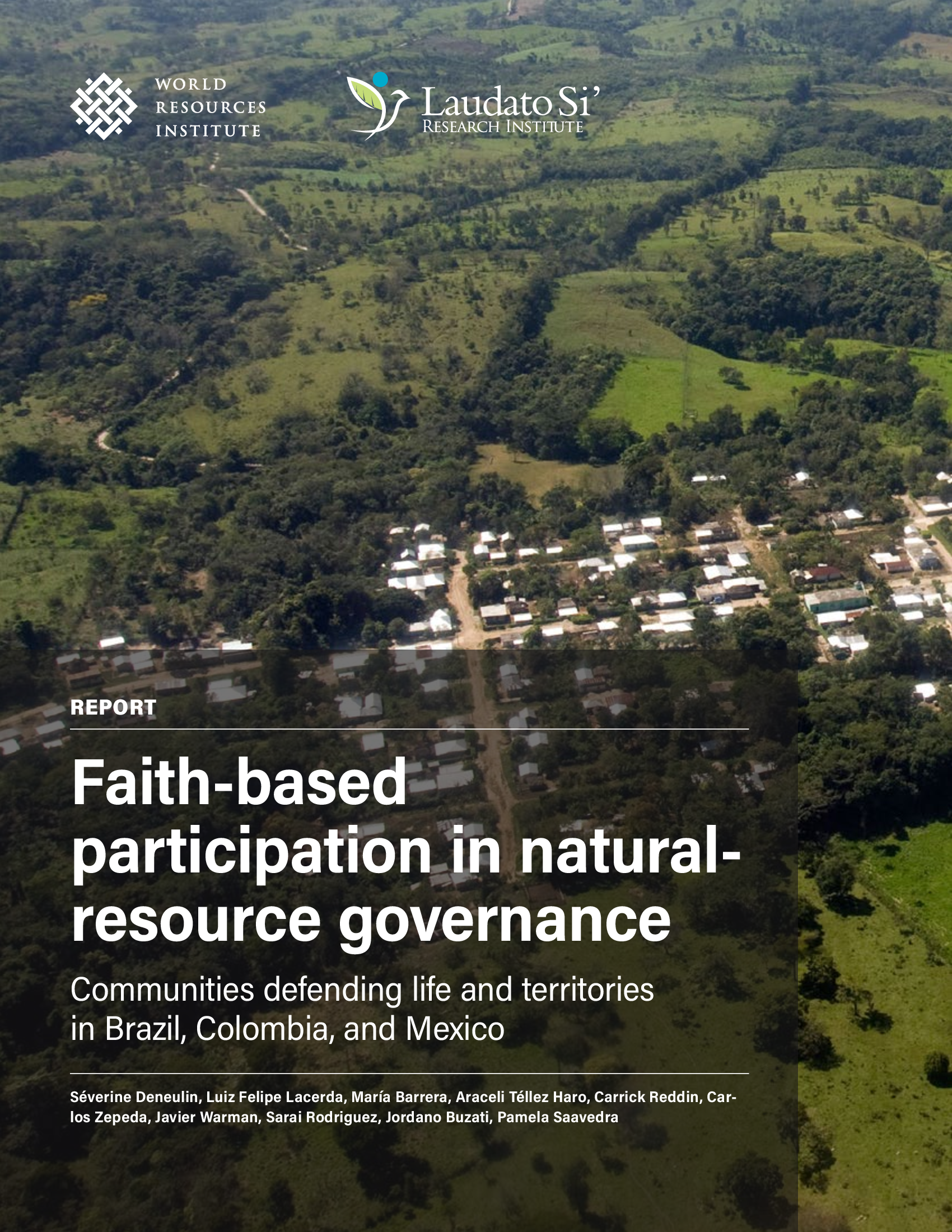Faith-based participation in natural resource governance (2022-2024)
Communities defending life and territories in Brazil, Colombia, and Mexico
Séverine Deneulin Carlos Zepeda Luiz Felipe Lacerda María Paula Barrera Araceli Téllez Carrick Reddin Javier Warman Sarai Rodríguez Jordano Roma Buzati Pamela Saavedra
Description
The World Resources Institute and the Laudato Si' Research Institute, Campion Hall, University of Oxford, in partnership with local researchers and communities in Brazil, Colombia and Mexico explore how religious actors shape strategies to find peaceful resolutions to socio-environmental disputes in their regions. We thank the Natural Resources and Climate Change Program at the Ford Foundation for supporting the research. The report is available in English, Spanish and Portuguese.
Highlights
Faith communities are important yet often neglected actors in socio-environmental disputes. For Christian communities and the Catholic church in particular, our research highlights that they understand their actions as defense of life and territories rather than participation in natural-resource governance.
Faith communities deploy strategies of defense that integrate a symbolic-spiritual, community, discursive, and socio-political dimension and that shape the search for alternative socioeconomic development models aimed at human and ecosystem flourishing.
Faith communities are highly heterogeneous in their involvement in socio-environmental disputes. Among the most influential factors for positive involvement are being part of the lives of local communities, understanding ecological commitment as an expression of faith, and providing formation that links spirituality with social realities.
Women play a leading role in defending life and territories, but their leadership is not given due recognition in ecclesial structures. Formally recognising women’s leadership in faith communities is key for protecting the rights of rural, low-income, and Indigenous communities in socio-environmental disputes.
This report recommends that international organisations, governments, civil society, and other stakeholders explicitly recognise faith communities and their members as important environmental defenders and adopt a community approach to protecting them and supporting their visions for locally led development.
Executive Summary
Today, the world is facing challenges of biblical proportions for people, nature, and climate—and it requires a new level of imagination and collaboration to solve it. The solution requires the work of more than just scientists and diplomats. As Pope Francis has said, “If we are truly concerned to develop an ecology capable of remedying the damage we have done, no branch of the sciences and no form of wisdom can be left out, and that includes religion and the language particular to it.”
Today, over 80 percent of the global population identifies with a religion. As social and environmental challenges become increasingly interconnected, the role of these faith communities in advocating for a more just and sustainable world has never been more critical. Yet, faith leaders and their communities are often overlooked actors in the defense of human rights and environmental protection. There is a particularly urgent and promising opportunity to mobilize faith communities in Latin America. This region, rich in biodiversity and natural resources, is also one of the most dangerous for environmental defenders. Brazil, Colombia, and Mexico have seen alarming rates of violence against those fighting to protect their land rights. They were among the top deadliest countries in the world for environmental defenders last year.
Faith communities, driven by a profound care for nature and human wellbeing, are already developing innovative strategies to defend human life and the natural environment under threat from extractive industrial and development projects. This report examines four case studies in Brazil, Colombia, and Mexico that showcase their unique and effective approaches driving local change. Together, their advocacy presents alternative models of development that emphasize the inseparable flourishing of humans and ecosystems. By integrating various symbolic, spiritual, community-centric, and socio-political dimensions, they establish a holistic narrative of locally led sustainable development. To protect their lands and futures, faith communities are effectively leveraging valuable wisdom that extends beyond the traditional hard science. The research finds that Christian—and in particular, Catholic—communities are largely driven by a desire to protect people and their land as an integrated and interconnected whole, rather than to protect the environment as if it was an external setting in which humans live.
In addition, a spiritual connection with the land and water itself has proved critical in bringing communities together and offering them motivation and hope at moments when their territories and futures are threatened by extractive or mega-infrastructure projects. The examples in the report also underscore the critical leadership role women play in these communities. Despite often being underrecognized in formal religious structures, women are essential in both defending human rights and protecting land. Recognizing and supporting their leadership is crucial for safeguarding the rights of rural, low income, and Indigenous communities while also addressing the crises of inequality, biodiversity loss, and climate change.
It is imperative that international organizations, governments, civil society, and other stakeholders explicitly recognize, learn from, and engage more effectively with faith communities. Learning to speak each other’s language is critical to finding long-term, equitable solutions that work for communities on-the-ground and scaling real impact across the world.

The Chiapas community, Mexico, receiving the report. Photo by Rodrigo Pinto SJ.

Mobilisation to protect water in Caquetá, Colombia. Photo by Comisión por la Vida del Agua.
Acknowledgments
This report was led by the WRI Faith and Sustainability and Laudato Si’ Research Institute teams and produced in collaboration with WRI Brazil, WRI Mexico, and three researchers from Brazil, Colombia, and Mexico.
We are very grateful to Tony Bebbington for his support for the project and to the Natural Resources and Climate Change Program at the Ford Foundation which funded the research.
The research was made possible thanks to the contributions of time and experience from the communities where the case studies took place, whom we thank for their trust, collaboration, and support: Apodi Rural Workers Union, Assembly of God Church of Altamira, Baptist Church of Apodi, Black Women's Movement of Altamira, Catholic Church of Apodi, Comisión por la Vida del Agua, Compañía de Jesús, Congregation of the Sisters of Notre Dame, Diaconia Network and the Municipal Secretariat of Agriculture of Apodi, Diocese of Xingu, Diócesis de San Cristóbal de las Casas, Franciscan Sisters of Altamira, Gobiernos Comunitarios, Hermanas del Divino Pastor, Indigenous Leaders of the Juruna Peoples, March 8 Feminist Center, Misión de Bachajón, Modevite Chiapas, Movement of People Affected by Dams of Altamira (MAB), Paiacu Indigenous Center, Pastoral Land Commission of Altamira (PA) and Apodi (RN), Universidad Iberoamericana, Women's Movement of Altamira (PA), Xingu Movement Forever Alive, Xingu Riverside Council.

Download PDF (English)
(13.32 MB)
Descargar PDF (Español)
(13.09 MB)
Baixar PDF (Português)
(6.33 MB)

